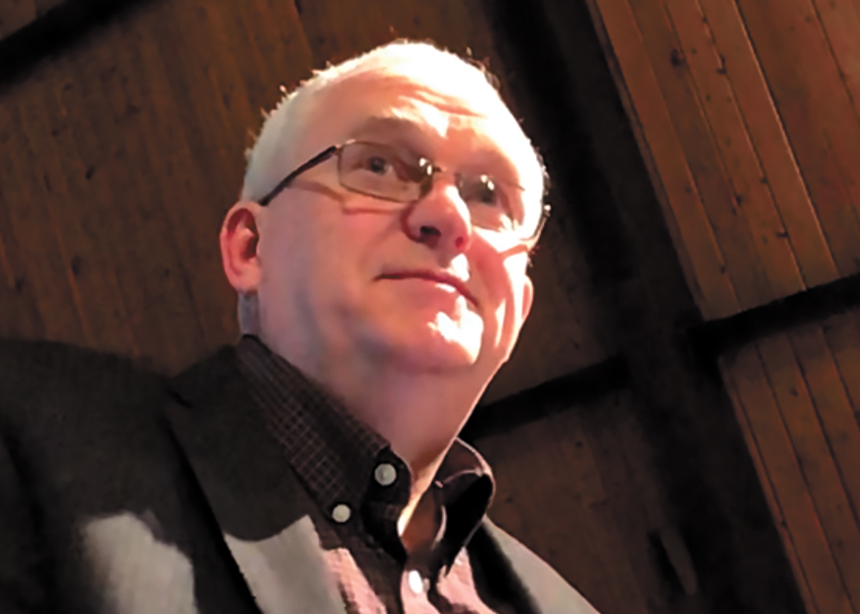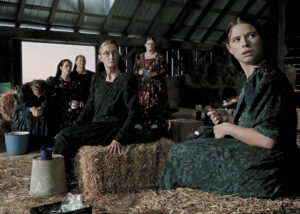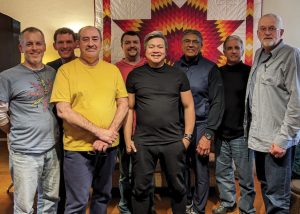Don Neufeld shared his reflections on the themes of masculinity and Anabaptism at a “Probing the potential for peace” discussion series held at Grace Mennonite Church in St. Catharines on May 3.
His insights came from years of experience working for House of Friendship in Kitchener, Family and Children’s Services in Niagara-on-the-Lake, and for almost a decade as a private-practice therapist in St. Catharines. He was recently appointed coordinator of Mennonite Men in Canada.
After more than 30 years of working in the social-work field, he feels compelled to give voice to a perspective on the lives of men.
His first job in Kitchener with socially disadvantaged men led him to realize how differently he had been raised within a stable and secure family, a supportive community and a belief in a loving God. This difference in child-rearing helped him make better choices than the men he was working with, who were struggling with the consequences of their actions. But as he encountered these abusive men, and listened to their stories, he realized that they had also been abused and neglected. Their unacceptable behaviour came from their experiences, not because they were male.
His observations include:
- Many men have deep insecurities.
- Men have been taught to be tough and not to rely on others, and, as a result, they often do not seek counsel for their issues.
- Much of the bad behaviour of men lies in the difficulty in finding their own identity.
- Society must honour men who, through the centuries, have acted in good faith within their understandings of masculinity and their roles as men, while now working with diligence to address the deficits of this understanding and broaden their opportunities as men to live fully.
- In the past decades, girls have heard the message that they can be anything and do anything—which has been good—but what messages have boys been given?
- Men have become much more a part of their core families, but when the relationships fail, the power to punish the fathers comes through the court system.
Much work needs to be done on gender and justice issues for the purpose of bringing healing to hurting men, and for building healthier relationships in the family and in the community, he said.
Neufeld looked at three areas of Anabaptist theology for what it offers:
- Discipleship: Called to respond to God’s love, to seek peace and justice in human relationships here on Earth. This involves positive and life-giving connections with self, with others and with God.
- Community: The antithesis of the solitary man. Boys and men have not been taught the skills of emotional intelligence, and thus they find it hard to relate well in relationships. This results in isolation and loneliness. Community is welcoming, encouraging and supporting; it leads to healing, growth, friendships and intimate relationships.
- Peace: Responding nonviolently to enemies and seeking reconciliation with others. The world pays the price of men who lack peace. This lack of emotional resilience makes it difficult for men to face loss and grief, who too often fall into despair and react through violence or addictions to the experiences life deals them. Peace comes from within.
The revisioning of masculinity is to give men more opportunities to grow emotionally, relationally and spiritually, to become whole. Men need to work on healthier relationships, for the sake of future generations.
 Much of his presentation was based on Peaceful at Heart: Anabaptist Reflections on Healthy Masculinity that he co-edited with Steve Thomas. This new resource addresses these issues; 16 men contributed chapters, and three women provided reflections.
Much of his presentation was based on Peaceful at Heart: Anabaptist Reflections on Healthy Masculinity that he co-edited with Steve Thomas. This new resource addresses these issues; 16 men contributed chapters, and three women provided reflections.
People who attended the discussion found the topic intense.
“I was most impressed by Don Neufeld’s presentation,” said Desmond Dequiera. “One reason is that . . . he proposed that it would be incorrect to assume that men are innately violent. Rather, most violence in men can be attributed to historical socialization, often starting from the ‘cradle.’ ”
“I came away from Don’s talk encouraged, with hope that his . . . book will be a tool to help men overcome cultural and socialization influences, which keep them from being able to relate to women in healthy and equitable ways,” said Ruth Beekhuis.
Further reading:








Leave a Reply
You must be logged in to post a comment.